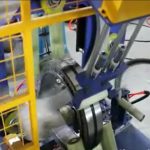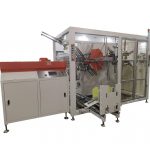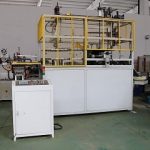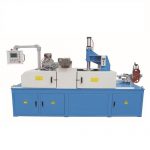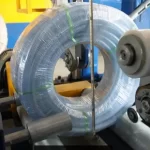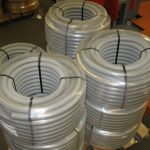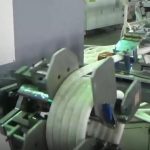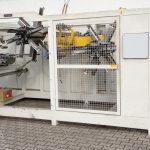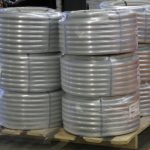This is the automatic rubber hose coil packing machine video testing for customer checking.
How Automated Wrapping Machines Meet the Growing Demands of the Rubber Hose Industry
As the rubber hose industry expands to meet diverse market needs, the role of automated wrapping machines has become increasingly significant. These machines offer efficiency, consistency, and cost-effectiveness, making them essential for modern manufacturing processes. This comprehensive article explores how automated wrapping machines address the unique challenges and demands of the rubber hose sector.
Understanding the Rubber Hose Industry
Industry Overview
The rubber hose industry serves a wide range of applications, from automotive to industrial and household uses. With the rising demand for durable and reliable hoses, manufacturers are under pressure to enhance production efficiency and quality.
Challenges in Production
Manufacturers face several challenges, including maintaining product quality, reducing waste, and ensuring timely delivery. Meeting these demands requires innovative solutions in packaging and logistics.
The Role of Automated Wrapping Machines
What Are Automated Wrapping Machines?
Automated wrapping machines are designed to wrap products efficiently and consistently. In the rubber hose industry, these machines ensure that hoses are securely packaged, protecting them from damage during transportation and storage.
Key Features
These machines offer features such as programmable settings, adjustable tension control, and integrated safety mechanisms. These capabilities make them versatile and adaptable to varying product specifications.
Benefits of Automated Wrapping Machines
Increased Efficiency
Automated machines significantly increase efficiency by speeding up the wrapping process. This efficiency allows manufacturers to meet high production demands without compromising quality.
Consistency and Quality Assurance
Automation ensures consistent wrapping quality. Machines apply the same tension and coverage with each wrap, reducing human error and ensuring that every hose is packaged to exact specifications.
Labor Cost Reduction
By automating the wrapping process, companies can reduce labor costs. This reduction allows staff to focus on more strategic tasks, enhancing overall productivity and job satisfaction.
Enhancing Product Protection
Minimizing Damage
Proper packaging is crucial for minimizing damage during transit. Automated wrapping machines provide a secure and protective layer around hoses, safeguarding them from environmental factors and physical impacts.
Improved Load Stability
These machines enhance load stability by ensuring even distribution of wrapping materials. This stability prevents shifting and maintains the integrity of the packaged product.
Integration with Smart Technology
Real-Time Monitoring
Modern wrapping machines integrate with smart technology to offer real-time monitoring. This integration allows operators to track performance and identify potential issues, ensuring optimal operation.
Predictive Maintenance
With IoT capabilities, machines can predict maintenance needs, reducing downtime and ensuring continuous production. This proactive approach minimizes disruptions and maximizes efficiency.
Environmental Considerations
Sustainable Packaging Materials
The industry is moving towards sustainable packaging materials to reduce environmental impact. Automated machines can accommodate eco-friendly films, aligning with green initiatives and corporate responsibility.
Energy Efficiency
Advanced wrapping machines are designed for energy efficiency, reducing power consumption and lowering operational costs. This efficiency supports sustainability goals while enhancing profitability.
Industry Applications
Automotive
In the automotive sector, rubber hoses are crucial for various systems. Automated wrapping ensures these hoses meet stringent quality and durability standards, supporting vehicle safety and performance.
Industrial and Hydraulic
Industrial and hydraulic applications demand robust hoses capable of withstanding high pressures. Automated wrapping machines provide the necessary protection, ensuring hoses are delivered in optimal condition.
Household and Consumer Goods
For household uses, aesthetic appeal and functionality are key. Automated machines offer precise wrapping, enhancing the product's visual appeal and usability.
Real-World Success Stories
Case Study: Automotive Supplier
An automotive supplier integrated automated wrapping machines, resulting in a 40% increase in productivity and a 30% reduction in labor costs. This transformation allowed the company to meet rising demands while maintaining high standards.
Case Study: Industrial Hose Manufacturer
An industrial hose manufacturer adopted smart wrapping solutions, achieving a 25% reduction in material waste and a significant decrease in product damage during transit. This improvement led to increased customer satisfaction and loyalty.
Future Trends in Automated Wrapping
AI-Driven Innovations
The integration of AI-driven technologies in wrapping machines promises further enhancements in efficiency and flexibility. AI algorithms can optimize wrapping patterns and adjust settings in real-time, adapting to changing production needs.
Customization and Flexibility
As demand for customized solutions grows, future machines will offer greater flexibility. Manufacturers will be able to tailor wrapping processes to specific product requirements, enhancing both efficiency and customer satisfaction.
Focus on Sustainability
The push for sustainability will continue to drive innovations in packaging materials and energy-efficient designs. Future wrapping machines will play a key role in reducing the industry's carbon footprint.
Conclusion
In conclusion, automated wrapping machines are vital in meeting the growing demands of the rubber hose industry. By enhancing efficiency, consistency, and protection, these machines provide a competitive edge for manufacturers. As technology advances and the industry evolves, embracing automation will be crucial for achieving sustainable growth and operational excellence. Investing in the right wrapping solutions not only improves productivity but also positions companies to thrive in an increasingly competitive market.
